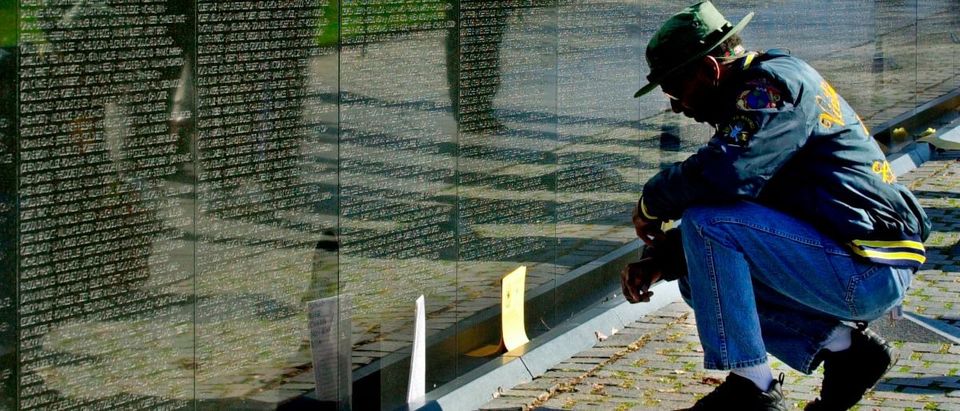Don’t expect parades down Constitution Avenue, flyovers of the B-2 bomber or 100-gun salutes from the Esplanade. The Pentagon still needs to pinch pennies, even though we hocked the grandchildren during last week’s trillion-dollar budget deal. But Thursday marks the first celebration of what will become an annual observance: the National Vietnam War Veterans Day.
Signed into law by President Donald Trump last March, the new law aims to correct a 50-year oversight by thanking the roughly nine million veterans who served during the Vietnam era (1955 to 1975). General Barry McCaffrey, one of its most heavily decorated heroes, received the first of the commemorative lapel pins that will be awarded to every veteran who served during those two decades.
One of the new law’s co-sponsors, Senator Joe Toomey (R. Pa), said last year that an unpopular war meant that some veterans “were actually treated quite poorly (during) a tragic period in our history driven by people’s perceptions of the war. Fortunately, that, I think, is behind us now.”
Sorry, Senator, but neither commemorative lapel pins nor teary-eyed expressions of patriotic good will can camouflage an overriding generational reality: The widening gap between our soldiers and the society they swear to defend with their lives. You need look no further than the notorious example of Gregory Salcido, the Rancho Mirage, California high school teacher who recently unloaded on one of his students wearing a U.S. Marines sweatshirt.
“Think about the people who you know who are over there,” Salcido said. “They’re not like high-level thinkers, they’re not academic people, they’re not intellectual people; they’re the freaking lowest of our low.”
The wonder of this incident is that Salcido was summarily fired rather than being held up as an icon for the greater edification of snowflakes all across the land. The key may lie in proximity because the great Marine training centers of San Diego and Camp Pendleton are within easy driving distance of Rancho Mirage. Unlike many Americans, Salcido’s audience probably knew Marines on the front lines and may even have seen themselves as likely recruits. No wonder they were outraged by such an idiotic outburst from a man paid to be their teacher!
But today, young people who might actually know other young people in uniform are the exception. Ever since September 11, our fighting has been done by less than one percent of our population, a new style of American warfare primarily fought using Other People’s Kids. Their small numbers compel those dedicated few to return to the combat zones three and four times. They inevitably risk falling victim to a perverse kind of Murphy’s Law. With greater combat exposure, they run greater risks of losing limbs, of incurring traumatic brain injuries or of contracting PTSD.
It is as if we had forgotten one of the key lessons from Vietnam, where combat tours for a draftee typically lasted just one year: But back them, we first learned about PTSD. In his groundbreaking 2010 book, “Combat Trauma,” James D. Johnson documented the decades-long struggle of sixteen former soldiers, all exposed to intense combat in Vietnam. His startling conclusion: Unlike athletic training, there was no way to prevent trauma through painstaking preparations. “The greater the exposure to traumatic events, the greater the likelihood that psychological injury will occur.” And while the wounds to the body would eventually heal, “the emotional effects of our combat trauma are with us for a lifetime.”
Increasing combat trauma through repeated deployments is part of an even larger problem: America’s decision in the 1970s to end the draft in favor of an all-volunteer force. In a 2014 International Security Affairs article, I argued that it has become far easier for political elites to engage in discretionary wars like Iraq and Afghanistan.
Because we fight with a professional force of volunteers, there is no need to justify casualties that rarely include the sons or daughters of senators or congressmen. Even worse, with military service a career option rather than an obligation of citizenship, we effectively guarantee that future generations of our soldiers will be sent into harm’s way by a draft dodger or a community organizer. Both military service and professional expertise in national security are effectively compromised when future elites grow up without direct exposure to those harsh disciplines.
As a former draftee, it is difficult for me to accept that compulsory military service — however unpleasant — had certain bottom-line advantages that become most apparent only in retrospect. So I will gratefully accept my lapel pin when and if it arrives, remembering that Vietnam affected every soldier, sailor, airmen or marine: Regardless of where we served and whether our responsibilities were great or small.
Colonel Kenneth Allard is a former Army intelligence officer, West Point professor and military analyst for NBC News.
The views and opinions expressed in this commentary are those of the author and do not reflect the official position of The Daily Caller.


